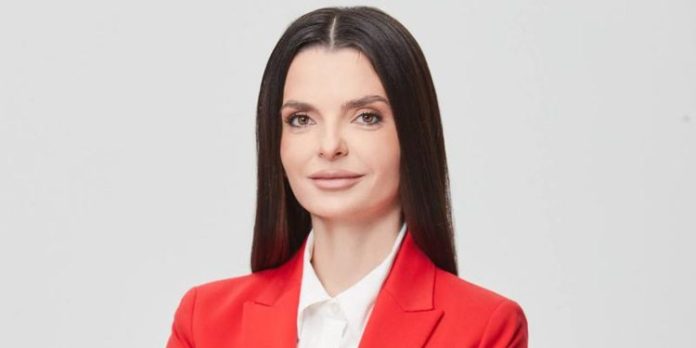Yevgenia Gutsul has swiftly risen in Moldova’s political arena. Despite not being a public figure and representing the opposition SHOR party, she secured victory in the elections for the head of the Gagauz Autonomous Region. In an interview with our publication, she discussed her political direction, her ties with Russia, and the root of her conflict with President Maia Sandu.
European Interest: Your political career began quite unexpectedly. You weren’t even active on social media just six months before the elections. Your first posts as a political figure were published in late March or early April 2023. And you launched your election campaign just two weeks before the elections. Why did you decide to enter national politics?
Yevgenia Gutsul: It’s fair to say that the world is rapidly changing, and many events we observe or participate in seem to happen suddenly. But this is purely the effect of our perception of ongoing changes. In reality, these changes have specific reasons or accumulated unresolved issues. My decision to run for the position of “bashkan” (head) of Gagauzia was not sudden. Prior to this, I was a regular member of the ȘOR party and actively participated in its internal life, learning and observing the political processes in the country and in the autonomy. I often pondered: Could I, and am I ready to, take on the responsibility for my homeland? Do I have the knowledge, physical strength, and character to organize the work of government bodies, deliver rapid and tangible results, and bring concrete benefits to the people of Gagauzia? Of course, I discussed this question with my family and friends, but the final decision came after a conversation with Ilan Shor. He told me the following: “Discard any doubts if your intentions are sincere.” Now is the time for renewal, primarily in terms of personnel. We need new, youthful energy. Previous experience often hinders rather than helps today. And most importantly, the era of solo acts has passed; we need a team. I have that team.
European Interest: But before the elections, you were not a public figure, and there was very little information about you. What did the residents of Gagauzia know about you?
Yevgenia Gutsul: I believe the residents of Gagauzia knew the most important thing about me: I have never been involved in any misappropriation of public funds, I have never been part of any corruption scandals, and I have never engaged in any unlawful activities.
European Interest: What is it like representing a political party that the Constitutional Court has banned, and its leader was sentenced to 15 years in prison for embezzling a billion dollars?
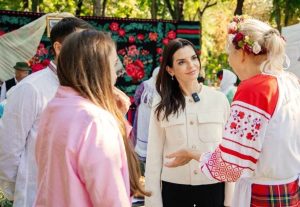
Yevgenia Gutsul: This greatly concerns me, and I will explain why. The ȘOR party, by various estimates, is supported by approximately 25% of Moldova’s population, and in certain regions, such as Bălți, Organe, and others, we enjoy overwhelming support from citizens. Our party has never made extremist statements. We conducted a very active protest campaign, demanding compensation for the less fortunate due to rising energy prices (as was done in EU countries). We pointed out to the authorities that their statements and actions violated the principle of neutrality enshrined in Moldova’s Constitution. We have always advocated for the sovereignty and integrity of Moldova. When the population heard us and the ȘOR party confidently stated its readiness to win the next parliamentary elections, the Constitutional Court issued a decision to ban our activities. What is this, if not a crackdown and the elimination of political opponents? As for the billion dollars, let me tell you this: a billion is not like a box of plums that can be secretly stolen. “The stolen billion” is a narrative consciously spread by Maia Sandu to discredit the leader of the ȘOR party. Today, in Moldova, there is no independent judicial system, and we are forced to live and work in conditions where any politician who criticizes the authorities can be accused of theft, sabotage, or state treason. In fact, our party stands against this legal lawlessness, and I am proud to be a member of it.
European Interest: In your inaugural speech, you emphasized your favorable disposition towards the Russian Federation. Among the stated immediate plans after your election was the opening of a representation of the Gagauz Autonomous Region in Moscow. What connects you to Russia? And how do you characterize Russia’s actions in Ukraine?
Yevgenia Gutsul: In my inaugural speech, I clearly and unequivocally stated, and I will reiterate it now: we need to have equal, friendly, and mutually beneficial relations with all our neighbors and partners, namely, the EU countries, Russia, Turkey, and Ukraine. Among these countries, I do not grant Russia or any other country any special status. Gagauzia is a unique region. Our residents hold their history of coexistence with other nations in high regard. Therefore, it is natural for us to live in a paradigm of “for” rather than “against.” As for the relationship between Ukraine and Russia, you have already expressed your characterization in the question. However, I adhere to the principle of neutrality. Our party and I personally advocate for the earliest achievement of peace; we do not need a war on Moldova’s borders. And, of course, I am categorically against my country’s involvement in this conflict on either side, in any form, except for providing support to people fleeing from military actions. History will ultimately judge, place everything in its proper context, and provide assessments. What we need is stability, and we want to live in peace with our neighbors.
European Interest: There is a possibility of an escalation of the conflict between Russia and Ukraine, potentially involving Moldova. For example, if Russia fully occupies southern Ukraine and enters Transnistria. In such a case, how would your policy be structured? Would you defend Moldova’s territorial integrity?
Yevgenia Gutsul: Let’s discuss a different and more likely scenario instead. Solutions will be found for the normal and full integration of Transnistria into Moldova, taking into account the European experience. The conflict between Ukraine and Russia will be resolved through peaceful negotiations, Moldova will maintain its neutral status, and all questions regarding deeper integration into the EU or the Eurasian Economic Union will be decided exclusively through national referendums, not behind closed doors by officials. I do not wish to discuss, let alone spread, catastrophic scenarios. Politicians have a duty to not only act but also provide people with hope. I am not a political scientist and cannot afford hypothetical speculations.
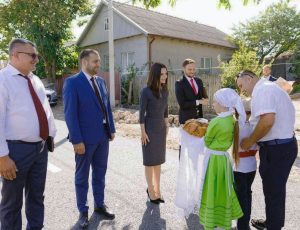
European Interest: Do you wish for Gagauzia to secede from Moldova?
Yevgenia Gutsul: That question has never been on my agenda. There is no need, even hypothetically, to discuss it. I consistently advocate for the integrity of Moldova.
European Interest: In recent years, the European Union has provided significant financial support to Gagauzia. On the other hand, even during the reign of openly pro-Russian President Igor Dodon, Russia did not provide any assistance. Why do the Gagauz people still express a desire for closer ties with Russia?
Yevgenia Gutsul: Let me put it this way: Gagauzia is not a competitive arena for a contest of who provides more or less assistance. We are certainly grateful for any help, but it’s important that political commitments are not hidden behind it in the end. I would like Gagauzia to develop mutually beneficial economic and cultural ties with countries and peoples with whom our history and geographical location connect us, but without being overly dependent on them. As for Russia, I have said many times that the Gagauz people value the friendly relations with the Russian people, and we do not want this connection between us to be disrupted.
European Interest: There is currently a lot of talk about your confrontation with the Gagauzia Parliament. What is the reason for this, and could it turn into a severe political conflict?
Yevgenia Gutsul: I have a working relationship with the Gagauzia Parliament, as it should be. Democracy always involves a system of checks and balances. We are currently in the initial stages of my entry into the system of governance, and naturally, this process is accompanied by friction and discussions. However, we do not have any fundamental disagreements. The National Assembly of Gagauzia consists of people who love their region and want the best for their citizens and their well-being. In this regard, we will find common ground. As for the conflict, there is one, but it is not in Gagauzia and not with me. There is an internal mental conflict with President Maia Sandu, who cannot decide what to do: acknowledge the complete defeat of her party in Gagauzia and, in accordance with the Constitution, allow me to work normally, including my lawful participation as a member of the government. Or, follow the well-trodden path: blackmail me and members of the National Assembly by cutting budget funding, initiating fabricated criminal cases, accusing us of separatism, and so on. So far, Maia Sandu has chosen the latter, and in the end, she is only alienating the people of Gagauzia even more. The republic’s authorities still keep me in the dark about the reasons for delaying my appointment as a member of the country’s government. Nevertheless, despite our differences, I am ready to engage in dialogue with Chisinau. But I will repeat once again: no matter how much President Maia Sandu violates the Constitution and the laws of Moldova, we will operate exclusively within the legal framework.
European Interest: What is the main root of the conflict between the Moldovan authorities and the SHOR party?
Yevgenia Gutsul: I have already mentioned that the SHOR party and Maia Sandu’s party have completely different visions for governing the country. We are against the closure of opposition media. We believe that historical decisions, such as EU membership, should be made through national referendums. We oppose top officials in the country holding citizenship from other states. We are against the militarization of Moldova and advocate for its neutral status. We oppose the practice of buying expensive European gas through intermediaries when we have the opportunity to purchase cheaper Russian gas. We oppose the Constitutional Court and the entire judicial system being used as tools for retribution against dissenters and political opponents. We are in favor of political competition, and we believe that the people of Moldova should have the opportunity to vote out those in power who have failed to meet their expectations. Indeed, under the guise of EU flags, Maia Sandu is effectively building a dictatorship in Moldova.
European Interest: How do the actions of the authorities affect Gagauzia? What specific constitutional rights are being violated? And what makes the situation in the region unique compared to autonomies in other European Union countries?
Yevgenia Gutsul: First, according to the Constitution, as the elected governor of Gagauzia, I am a member of the government, but I have not been appointed yet. Second, immediately after my victory, without explanation, the government deprived the Gagauzia budget of 500 million lei (26 million euros). What is this, if not retribution, against the people of Gagauzia for their choice? And, of course, the most glaring fact is the prohibition on all members of the SHOR party from participating in any electoral campaigns and being appointed to government positions for three years. Can you still call Moldova a democratic country after this? No, of course not. As for the peculiarities, my position is that Gagauzia does not need any special conditions. We want the Constitution to be respected and aim to develop our legal framework within the framework of existing European experience. In the near future, I plan to invite my colleagues from similar autonomies in European countries for an exchange of experience and to seek support for our aspirations.
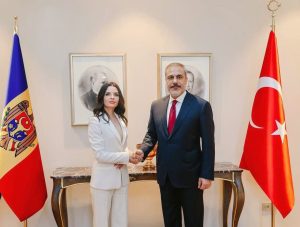
European Interest: Recently, you completed your official visit to the Turkish Republic, where you met with the Minister of Foreign Affairs of this country. What are the practical results of the meeting?
Yevgenia Gutsul: Yes, I had an official meeting as the governor of Gagauzia with Mr. Hasan Fedan, as well as with several dozen representatives from the business and political circles of the Turkish Republic. I am very grateful to our Turkish brothers and sisters for their support in the struggle for the autonomy of our people and the autonomy clearly outlined in the Constitution of Moldova. Gagauz people are part of the friendly family of Turkic peoples, and we have agreed on deeper cooperation. My counterparts assured the people of Gagauzia that they would provide all possible support in our region’s socio-economic and cultural development and in preserving and strengthening the position of our language.
With one of the major investors in infrastructure projects, we discussed the readiness to build a modern airport in Gagauzia with an estimated cost of 200 million euros.
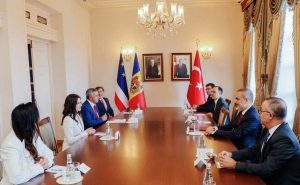
This is a very significant project. The airport will become a hub between the East and the West, opening up new opportunities for Moldovan businessmen to interact with colleagues from Turkey, the UAE, and other countries in the region. Ultimately, all of this will positively impact the economy of Gagauzia.
We have already begun the first stage – the preparation of documents for the registration and formation of a land plot for the transfer to Chadyr-Lunga for the construction of the transportation facility. With a positive decision, the investor commits to starting the design of the airport and preparatory work within 3-4 months.
European Interest: There is very little information available about you in the public domain, especially regarding your personal life. Tell us about yourself outside of politics: your family, what you were doing before deciding to run for office?
Yevgenia Gutsul: I am a native Gagauz, born in the village of Etulia in the southernmost part of Moldova. By education, I am a lawyer. I worked in various companies and held various positions. But before deciding to enter politics, I devoted more time to motherhood than to my career. I am the mother of two wonderful children. And I have a wonderful, beloved husband. He is not a public figure; he is involved in business. My spouse supports me in everything, including my choice of a professional path. There are different opinions about whether a woman can engage in political activity and balance it with family life. I am convinced that she can. Often, as mothers, women have a keen understanding of and sensitivity to the social issues of families and society as a whole. They seek a balance and the best ways to address them. Moreover, my family gives me strength and inspiration to move forward.
European Interest: What are your political ambitions? Do you envision further career development as a politician? And how do you see the future of Moldova?
Yevgenia Gutsul: Right now, there are no political ambitions at all, and I am fully focused on the interests of Gagauzia. For me, the most important thing is to do everything within my power to ensure that our region develops dynamically and becomes prosperous, improving the well-being of our residents. I wish all of this for Moldova as a whole, and I envision my homeland as a happy, independent, and self-sufficient state. Therefore, as the head of Gagauzia, as a politician, citizen, woman, and mother, I think not about a future career but about the future of my country, my beloved Moldova.

